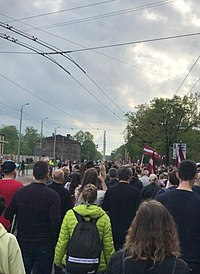Anti-Sovietism
You can help expand this article with text translated from the corresponding article in Russian. (January 2013) Click [show] for important translation instructions.
|

Anti-Sovietism, anti-Soviet sentiment, called by Soviet authorities antisovetchina (Russian: антисоветчина), refers to persons and activities actually or allegedly aimed against the Soviet Union or government power within the Soviet Union.[1]
Three different flavors of the usage of the term may be distinguished:
- Anti-Sovietism in international politics, such as the Western opposition to the Soviet Union during the Cold War as part of broader anti-communism.
- Anti-Soviet opponents of the Bolsheviks shortly after the Russian Revolution and during the Russian Civil War.
- As applied to Soviet citizens (allegedly) involved in anti-government activities.
History
In the Soviet Union

During the Russian Civil War that followed the October Revolution of 1917, the anti-Soviet side was the White movement. Between the wars, some resistance movement, particularly in the 1920s, was cultivated by Polish intelligence in the form of the Promethean project. After Nazi Germany's attack on the Soviet Union, anti-Soviet forces were created and led primarily by Nazi Germany (see Russian Liberation Movement).
In the time of the Russian Civil War, whole categories of people, such as clergy, kulaks and former Imperial Russian police, were automatically considered anti-Soviet. More categories are listed in the article "Enemy of the people". Those who were deemed anti-Soviet in this way, because of their former social status, were often presumed guilty whenever tried for a crime.[2][page needed]

Later in the Soviet Union, being anti-Soviet was a criminal offense, known as "Anti-Soviet agitation". The epithet "antisoviet" was synonymous with "counter-revolutionary". The noun "antisovietism" was rarely used and the noun "antisovietist" (Russian: антисоветчик, romanized: antisovetchik) was used in a derogatory sense. Anti-Soviet agitation and activities were political crimes handled by the Article 58 and later Article 70 of the RSFSR penal code and similar articles in other Soviet republics. In February 1930, there was an anti-Soviet insurgency in the Kazak Autonomous Socialist Soviet Republic village of Sozak.[3]
After the end of the Second World War, there were Eastern European anti-Communist insurgencies against the Soviet Union.
In Post-Soviet countries
Estonia
In August 2022 Estonia began removing Soviet monuments, beginning with a T-34 tank in Narva, saying it was necessary for public order and internal security.[4][5]
Latvia

On 6 May 2022, following the Russian invasion of Ukraine, Latvian Prime Minister Krišjānis Kariņš announced that the removal of the controversial Victory monument to the Red Army was inevitable.[7] Five days later a public fundraising campaign was launched and more than 39,000 euros had been donated by 12 May[8] when the Saeima voted to suspend the functioning of a section regarding the preservation of memorial structures in an agreement between Latvia and Russia.[9] By 13 May, the total amount of donations had almost reached 200,000 euros.[10]
A rally "Getting Rid of Soviet Heritage" taking place on March 20 was attended by approximately 5,000 people,[11] while a counter rally by Latvian Russian Union was not allowed over security concerns.[12]
A list of 93 street names still glorifying the Soviet regime (such as 13 streets named after the Pioneer movement), as well as 48 street names given during the Russification at the end of the 19th century (like streets named after Alexander Pushkin), has been compiled by historians of the Public Memory Center and sent to the corresponding municipalities who were recommended to change them.[13]
See also
- Anti-communism
- Anti-Soviet partisans
- Anti-Stalinist left
- Criticisms of communist party rule
- Enemy of the people
- German mistreatment of Soviet prisoners of war
- Red Scare
- Red Terror
- Soviet dissidents
- Soviet Empire
- Timeline of events in the Cold War
- Anti-Russian sentiment
- List of monuments and memorials removed following the Russian invasion of Ukraine
References
- ^ Conquest, Robert (2007). The Great Terror. USA: Oxford University Press. pp. 28–29.
- ^ Yevgenia Albats and Catherine A. Fitzpatrick. The State Within a State: The KGB and Its Hold on Russia - Past, Present, and Future, 1994. ISBN 0-374-52738-5.
- ^ Niccolò Pianciola; Paolo Sartori (2013). "Interpreting an insurgency in Soviet Kazakhstan : the OGPU, Islam and Qazaq 'Clans' in Suzak, 1930". Islam, Society and States Across the Qazaq Steppe: 297–340.
- ^ "Estonia removes Soviet Union war monuments". POLITICO. 2022-08-16. Retrieved 2022-08-18.
- ^ Olsen, Jan. "Estonia removes Soviet-era monument, citing public order". ABC News. Associated Press. Retrieved 2022-08-18.
- ^ "How this tiny Russian neighbour is fighting to save its tourism industry". Time Out. 16 May 2022.
- ^ "Soviet memorial's days are numbered, confirms Latvian PM". Public Broadcasting of Latvia. 6 May 2022.
- ^ "Fundraising begins in Latvia for dismantling Soviet monument". Public Broadcasting of Latvia. 12 May 2022.
- ^ "Saeima decides to legally allow Soviet monument demolition". Public Broadcasting of Latvia. 12 May 2022.
- ^ Zvirbulis, Ģirts (13 May 2022). "Nearly EUR 200,000 collected for demolition of Soviet memorial". Public Broadcasting of Latvia.
- ^ "Thousands turn out to support removal of Soviet relics". Public Broadcasting of Latvia. LETA. 20 May 2022.
- ^ "Security service gives red light to Latvian Russian Union's rally". Public Broadcasting of Latvia. 24 May 2022.
- ^ "Soviet-related street name change urged in Latvia". Public Broadcasting of Latvia. 8 August 2022.
